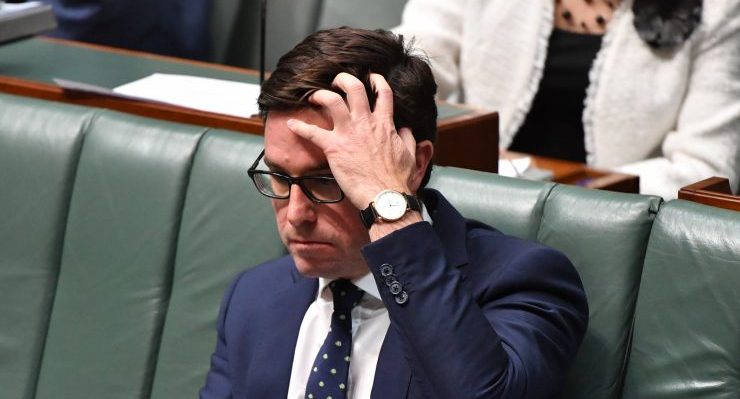
A meaty topic It’s become a refrain of the Morrison government in the era of COVID-19: whenever the government does something, it is simply following the science. This familiarity with science must be why our politicians feel so qualified to publicly slate scientific agencies, as the Nationals deputy and Agriculture Minister David Littleproud did yesterday. Listening to him, you’d assume the next front of the culture war is apparently plant-based fake meat — because all the good ones were taken, we guess?
Littleproud is going the CSIRO for having the temerity to include fake meat in its “digital tuckerbox“, an educational tool looking at the nutrition and environmental impact of various foods.
The tuckerbox brazenly says we eat a moderate amount of meat for the sake of the environment (which is true) and that you shouldn’t eat salami every meal (a directive we frankly don’t like any more than Littleproud does).
Littleproud has sent a letter — to the CSIRO, to Technology Minister Christian Porter, and to the public — arguing the CSIRO should “provide balanced support to Australian industries”.
The idea that science ought to be adjusted to suit commercial imperatives, or that it is somehow “biased” against everyday Australians, seems to be a common one in the Morrison government.
Coal coal heart What it is to behold free marketeers confronted with keeping a dying industry alive. And so COAG’s Energy Security Board, which contains former senior executives of coal-fired power companies, continues its call for public subsidies to keep coal and gas companies afloat.
As The Australian reports this morning: “Special payments will be needed to keep ageing coal-fired and gas power stations in business to avoid future spikes in electricity prices, under a national plan to shore up the energy grid”.
Apart from the fact this comes less than three weeks after an Intergovernmental Panel on Climate Change report that warned of catastrophic results if the world didn’t rapidly de-carbonise, surely these subsidies won’t be embraced by Energy Minister Angus Taylor, who once claimed wind and solar energy would “drive up the price of electricity, drive out baseload power, make the whole system less reliable and far less affordable” and lead to “de-industrialisation … and the loss of jobs”. Surely not the same minister who back in 2013 promised to review the “massive subsidies for wind farms, which are forcing up electricity prices and propping up an economically unviable industry”?
Odds on Unsurprisingly, our weary and reluctant report on rumours that Scott Morrison is going to call an early election caused quite a stir among our readers — some of the tips we got are collected elsewhere in today’s Crikey. One detail we will mention is the betting markets. Picking the correct month of the next election pays out $91 if the election is in September, $12 in October, and drops to $6 for November, before jumping back up to $51 in January.

Of course it’s become fashionable to think of betting markets as some kind of non-partisan oracle, able to predict election outcomes better than punditry or polling could hope. As we explored in the lead up to the last federal election, it’s not quite that straight forward. And it’s worth noting that, even if we do treat them as the most credible source, the odds are still shortest between March and May next year. We’ll keep an eye on it going forward.








I used to think Littleproud had a modicum of competence. That was a long time ago. He’s a goose as well, it turns out. These joker’s should just list themselves as lobbyists; it would save the charade of them pretending their a government.
“lead to “de-industrialisation … and the loss of jobs”
Angus, we de-industrialised ages ago, so I guess that the jobs you are talking about are the anticipated cushy sinecures for retired politicians on the boards of fossil fuel companies.The ones that they have protected and promoted during their political careers. Companies which now won’t survive without the federal government compelling those of us who do pay tax to support them. Talk about removing our freedom – the LNP don’t hesitate to infringe freedom of choice when it comes to larding their donors with our money.
Recommend “Meat: a threat to the planet” – BBC doco. May be on YouTube. Also excellent book “Collision Course: Endless growth on a finite planet” by Kerryn Higgs (aussie writer),2014 published. You get the history of economic growth as well as growth & consumerism and the most important chapter (in my opinion)- Persuading the people.
I do not have faith in the average person being able to change the world/nation/state/town in any meaningful way towards climate change. We need to truly understand the “enemy” and combat their influence. But the “persuaders” are just too powerful. Perhaps when bad climatic events are non stop some action may happen.
It’s like the sugar industry- we may be taxed for buying the over sugared foods -it’s an individual choice. Not so – it’s the food industry with adverts, plus over sugaring almost every supermarket product. And their free mags with recipes.
Why not simply decrease sugar by 50% in some foods? Money,money and more money.
On Mock-Meats, I fundamentally think conservatives hate it as a product because it does less harm. It’s the only thing that would make sense, because why else would you argue so fervently against a product if deep down you didn’t secretly enjoy knowing it caused so much suffering?
We can import all these plant to make fake meat? What’s that, we grow it here, too?